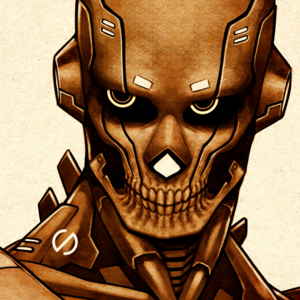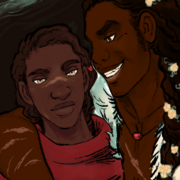Eames wanted to sigh, but he didn’t have a mouth. So he did it mentally.
He wanted to blink, but he didn’t have eyes. So he settled to stare at a twinkling star in the distance.
It was tough being a planet. People said sometimes when you were in a quiet room, the silence could be so deafening it became a kind of noise of its own. Eames wished for any kind of sound, but it was an impossible wish in the vacuum of space. Nothing but all-encompassing darkness and twinkling stars, like glitter spilled onto a flowing piece of black velvet.
But Eames hadn’t always been a planet. There was a time when Eames was a normal and unremarkable human being, just one out of the seven and a half billion others populating the surface of that blue mudball of a planet. Eames was a pasty-white guy with blue eyes, blond hair, and a pair of horn-rimmed glasses that gave him the appearance of a constipated librarian. He met his wife Eileen when he was in senior year of college, and they dated for three years before settling down and getting married.
Eileen was a too-beautiful-for-this-world kind of person. Flowing brown hair, tanned skin, sweet smiles, sunny disposition. One would’ve thought that after years of being married, Eames would be able to describe his only beloved in a more flattering and detailed manner. He wracked his brain to build a more vivid mental reconstruction of Eileen, to make her into something special that was his and only his, but all he could pull from the depths of his mind were insignificant, mundane details. Eileen loved dark roast coffee, something she drank every morning by the mugful. She wiggled her toes when she was unsure of herself. She usually wore loose floral knee-length dresses. Her favorite color of nail polish was Fuchsia Pink. And her smiles, yes… her smiles were what he could recall most frequently. They flooded Eames with a warmth that he craved, one that filled his soul full and whole.
Even five hundred years later, the image of her dimpled cheeks and gleaming white teeth brought a ghost of that warmth into his being. More importantly, however, it served to remind Eames that he was alone right now.
Eames had loved Eileen with all his being. He had taken her on many long walks down old cobbled streets, holding her hands tenderly and singing love songs to her like a lovesick fool. At the point when couples had just committed to each other, and love was still a feeling, ideal and beautiful, he had slipped the engagement ring onto her finger and asked her to be his wife.
Then love slowly became commitment as reality set in - bills, chores, jobs, paying rent, sometimes just waking up in the morning. And then even commitment dissolved into choice as they chose to make it work - through Eames’ increasing bitterness and dissatisfaction with his occupation, a soul-sucking office job where he sat at a cubicle typing away at Excel spreadsheets for hours on end, through Eileen’s inability to have children, through their decision to move across the country to Washington so that Eames could explore new possibilities. It wasn’t always pretty, but they made it work.
And sometimes, sometimes when Eames lay wide awake at night, staring up blearily at the ceiling and mentally cursing his habits of consuming copious amounts of coffee during the day, he thought that it wasn’t all bad. In a sense, he was content. He was happy as a human.
Eames couldn’t remember the last time he was happy as a planet.
Eames had forgotten a lot of things, but that’s to be expected after a hundred years. Still, he doggedly clung to his memories with the persistence of a snail crawling up the side of a house, not knowing where it would go but still moving forward. There was one memory in particular that he clung to desperately. When he pulled at that memory, like a child pulling at the tail strings of a pinata donkey, other memories naturally rushed forward from the depths of his mind and came tumbling down like candies and sweets in a deafening cacophony of sounds, images and colors.
A summer afternoon, bright and cheerful. Eames and Eileen sat on the front porch of their house - he on his corner bench, and she in her rocking chair - watching the neighborhood children ran around playing fetch with their dogs. Eames didn’t understand why Eileen insisted on this activity every afternoon, but he followed along. Most of the time they would just sit in silence to watch the children play, and Eames would get bored and flip open the newspapers he kept in a nearby stand, next to the umbrellas and coat hangers. Eileen’s eyes would always be clouded with longing the longer she watched, and even though Eames knew what was going on in her mind, he didn’t know what he could say to make her feel better. He wasn’t a woman and he wouldn’t dare claim to sympathize with her deeply, but he understood the feeling of wanting so desperately something he could never have in his grasp.
It was a feeling he got when he was fifteen, gazing across the classroom to watch a red-haired boy with freckles and a dimpled smile, grinning at the girl sitting by his side and kissing her cheek. Eames’ chest burned at the sight, and his eyes began to water, as if he was seeing a forbidden fruit he dared not taste, and it had took all of his willpower to tear his gaze away from the tender scene.
“Hey, Eames?” Eileen broke the silence.
“Yeah?”
“Let’s go to heaven together.”
Eames looked at her sharply, suddenly alarmed. “... What brought this on?”
“I don’t really know.” Eileen stretched her legs and wiggled her toes. “I think about it sometimes. We might die someday. Any day. I might die before you, you might go before me. And we don’t have any children to take care of the one left behind. The point is, one of us would be alone.”
Eames remembered the time he caught Eileen staring at her reflection in the bathroom mirror, her trembling fingers trailing across the wrinkles and dark spots that came with age. Then she ran her hands through her brown hair, pulling at her peppered locks and whispering fervently to herself. He had never seen Eileen so lost, staring at her own image as if she was looking at a stranger.
“... It’s no time for you to think such things yet. You’re barely fifty.”
“It’s going to happen, you know. Sooner or later. It’s always time to think about these things.”
Eames didn’t reply.
“... Hey, Eames?” Eileen stood up and shuffled silently to his side, clasping his hands in her smaller ones. “Let’s make a promise.”
He looked at her, puzzled.
“Let’s go to heaven together.” She repeated. “I’ll become a star, and I’ll wait for you. You’ll become a star and wait for me. It’ll just be the two of us in the universe. Two twinkling lights in the night sky, next to each other for all eternity.”
Eames laughed out loud at her silliness. “What kind of sappy promise is that? Did you read romance novels before bed again? The Notebook or whatever?”
“Promise me!” Eileen’s cheeks flushed in embarrassment, as if she had only now realized how ridiculous that promise sounded.
Filled with uproarious laughter, Eames wrapped his arms around Eileen and wrestled her smaller frame closer. “That’s unnecessary. Eileen, you have me. I have you. We’re going to grow old together and die holding hands in front of the fireplace. Just like in the movies. Well, we don’t have one, but we can install one easily enough. I think we still have some savings left from our trip to Hawaii last year.”
“T-that’s not the point! Eames-” When Eileen began to stutter, it meant she would get sulky and broody later. So Eames planted a big, noisy kiss on her cheek, making her groan exasperatedly and poke at his forehead gently.
“I know, I know. I promise.”
He promised her, if only to make her happy.
Eileen died four years later in a car crash.
She was right. Eames was lonely after her death, and aside from a few distant nephews and niece, he didn’t have anyone. As a result he picked up smoking. He needed a distraction from the hole inside his chest, from the hole inside his house and his routine. Eileen was gone, and there was a hole in every aspect of his life that he couldn’t fill. When the bitter, biting white smoke from the cigarette billowed from his lips and rushed down his trachea, his mind clouded and blurry like a murky lake in the morning spring mist, he could pretend that things were alright, and that Eileen was there with him. He smoked like a chimney from sun up to sundown, one cigarette after another, as if he was trying to suffocate his sorrows with nicotine. Lung cancer claimed Eames at the age of eighty.
And now he was here. The only thing he had left was that promise.
What did they call it? Star-crossed lovers? Eames was a goddamn planet. A big, hot ball of angry swirling gas, with torrential storms on the surface and a hostile environment unsuitable for organic life. Were planets even stars? Eames wouldn’t have known. Natural history had never been one of his strong points anyway.
He never forgot that sappy promise, because Eileen promised it to him, and she swore she would fulfil it. Eames trusted her. At the beginning he had felt special - what were the chances that out of the billions of wishes possible, his was chosen to be fulfilled? After five hundred years, however, Eames had started to lose hope as he realized that he might never see Eileen again. Planets neither died like normal human beings, nor were they in any sense close to each other. And Eames couldn’t even kill himself as a planet if he had tried.
His thoughts slowly turned into smoldering rage and indignance. Universe had to screw with him a second time, disguising a curse in the form of a blessing. He was lonelier than ever now, and Eileen was somewhere far beyond his reach. He wanted to die.
Then a comet came straight for him and crashed into his celestial body.
******
The good thing about being a planet, Eames thought distantly, was that planets didn’t feel pain. The intricate network of neurons that detect stimuli and pass them to the brain was nonexistent in a planet’s makeup, thus the feeling of “pain” did not exist to Eames. By the extend of that logic, planets shouldn’t have feelings either, as planets did not possess the brain to create the emotions that humans loved to attribute to the heart. But Eames had feelings, lots of them, and the most prominent one at that moment was panic. He could only watch in morbid fascination as the comet barreled through his outer shell and came to a stop near his molten core. Eames could see bits and pieces of himself being scattered in fiery explosions of light and heat, like fireworks on the Fourth of July. He should be scared, and he was scared, but he realized he couldn’t care less. Maybe his time had come, and he could finally start anew instead of living this monotonous existence.
His tired and weary thoughts were cut short by a soft and wispy voice, somehow carried through the vacuum of space to his imaginary ears. The voice brought him back to that summer’s day so long ago, and a mixture of hysteria, relief, happiness and anger flooded his entire being until everything no longer made sense.
“I’m home.”
Eames had also forgotten that comets were called shooting stars.












Comments (104)
See all